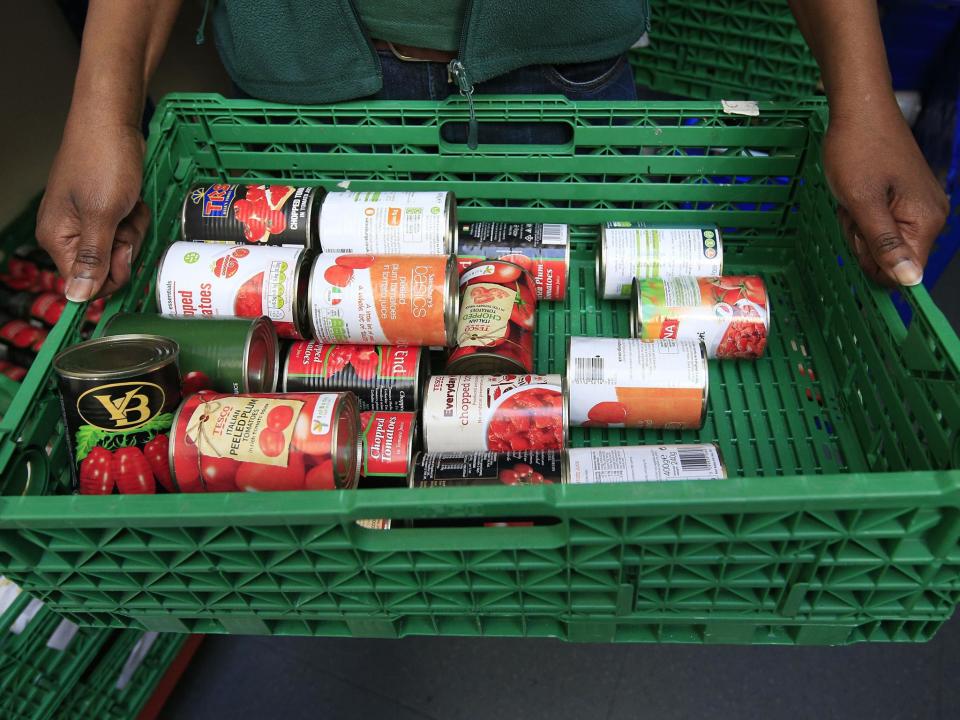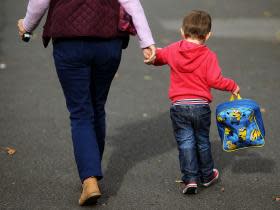Food bank demand surges in areas where people have received universal credit for longest, figures show

Demand for food banks has surged in areas where families have been relying on the bungled universal credit system the longest, figures show.
Regions that were first to switch to the controversial benefit two years ago have seen a rise in demand for emergency food packages of nearly 50 per cent, according to the Trussell Trust, the largest UK food bank provider.
Areas in which it has been in operation for 18 months saw a rise of 40 per cent, while those where universal credit had been introduced in the past year had a 30 per cent increase in demand.
Politicians and charities said the benefit “fatally undermined” the principle of tackling poverty because it requires each new claimant to wait at least five weeks before receiving their first payment.
The Department for Work and Pensions (DWP) claims to have solved this issue with measures such as offering loans to people while they wait, but the Trussell Trust said this was ineffective and often only pushed more people into debt.
The Independent reported earlier this year that deductions applied to people’s universal credit to pay back “advance payments” – loans offered to claimants while they wait for their first instalment – were leaving some living “hand to mouth”.
Amber Rudd, the former work and pensions secretary, said in February that universal credit was likely to be the main cause for claimants seeking emergency food aid, in a stark admission that contradicted repeated denials from previous ministers.
The new findings also revealed the detrimental impact the wait was having on people’s mental health, stating that some claimants had reported feeling suicidal, and others had reported experiencing high levels of anxiety, due to not knowing how much they would receive and when.
One man, named only Mike, had to resign from his job as a support worker to care for his mother who was diagnosed with a long-term disease and subsequently had to claim universal credit. He found that he could no longer manage to pay his rent after he took an advance payment.
Describing how it affected him, he said: “It’s made me go from being a confident lad who loved working with vulnerable people to ending up needing the support I used to offer others. Now I’m unable to support them or myself.”
Read more
Universal Credit ‘forcing parents to take out payday loans’
In light of the findings, the Trussell Trust’s chief executive Emma Revie said: “Universal credit should be there to anchor any of us against the tides of poverty. But the five-week wait fatally undermines this principle, pushing people into debt, homelessness and destitution.
“In a society that believes in justice and compassion, this isn’t right. But it is something that can be fixed. Universal credit was designed to have a wait. Now it’s clear that wait is five weeks too long, and we must change that design.”
Margaret Greenwood MP, Labour’s shadow work and pensions secretary, said the “shocking” figures showed that universal credit was forcing people to turn to food banks to survive, despite ministers’ “repeated” efforts to “explain away” any link.
“It is completely wrong for people to be left waiting five weeks or more for a first payment. Advances are not the answer; they are loans that have to be paid back, pushing people further into debt and leaving them vulnerable to scams,” she added.
Gillian Guy, the chief executive of Citizens Advice, said the charity’s own data showed some people on universal credit were losing sleep and unable to afford essential things like food, heating and housing, and called on the government to reduce the five-week wait and end the freeze on benefit rates.
“It’s clear, from the findings across the charity sector helping universal credit claimants, that the system is not providing everyone with the financial safety net people need,” she added.
A DWP spokesperson said the Trussell Trust’s data was “unrepresentative” and “categorically” did not prove that universal credit was the reason behind increased food bank usage.
The Trussell Trust responded by saying that the findings were drawn from data that was “trusted and the best available” from the more than 60,000 agencies that refer people to food banks in its network.
The DWP spokesperson added: “With universal credit, people can get paid urgently if they need it and we’ve changed the system so people can receive even more money in the first two weeks than under the old system.”
Read more
Read more Universal Credit ‘forcing parents to take out payday loans’
Ministers ‘still owe’ 10,000 disabled universal credit claimants
Claimants ‘left without food for days’ by universal credit mistakes

 Yahoo News
Yahoo News 